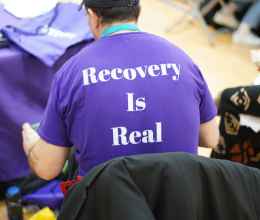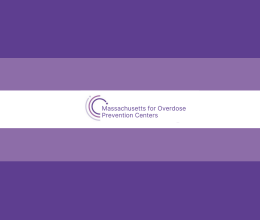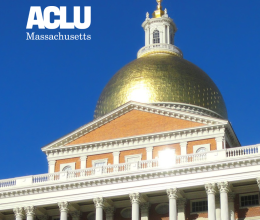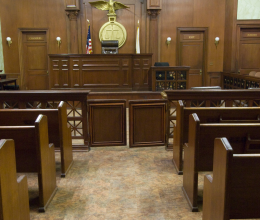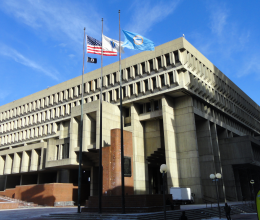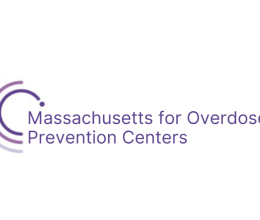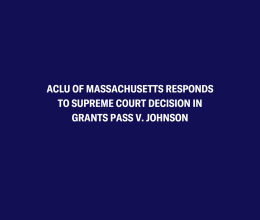
By Rahsaan Hall, director of the Racial Justice Program at the ACLU of Massachusetts
Sometimes it takes uncomfortable situations to deal with uncomfortable truths. The recent controversy between Suffolk County District Attorney Rachael Rollins and the defense bar—primarily the Committee for Public Counsel Services (CPCS)—has highlighted one such truth about the criminal legal system. This system is racist—but not in the way many people think.
It’s easy to point to the gross disparities in incarceration, the rate at which Black people are policed compared to white people, the privilege of being white and not being charged for offenses, or the disproportionate rate at which Black people are murdered by the police. But rarely is there a conversation about the ways well intentioned people are themselves complicit in systemic oppression.
This is evidenced by the controversy between DA Rollins and CPCS. In her desire to respond to a caller on a radio program who hadn’t heard from his attorney and was concerned about his upcoming court date, DA Rollins encouraged him to keep calling his lawyer and then suggested that he call the DA’s office. Despite her desire to help him get information, her recommendation crossed the line. Her best intentions cannot prevent someone at another DA’s office from soliciting potentially incriminating or personal information from the accused.
Within a matter of minutes Rollins was quickly and appropriately admonished by a public defender who called into the show. Instead of acknowledging that her statement was inappropriate DA Rollins focused on the shortcomings of the public defender’s office, suggesting that the lack of responsiveness to the caller and others like him was a function of privilege and race, citing a lack of diversity in the defense bar. The back and forth spilled over onto Twitter where public defenders and defense attorneys challenged Rollins’ assertions about their lack of responsiveness to Black and Latinx defendants.
No matter how many non-responsive defense attorneys failed to maintain communication with their clients, Rollins should have never recommended an individual who is being prosecuted to call that DA’s office. She could have just as easily directed the person to call the court to find out about the next court date. And even if the lack of diversity in the public defender’s office has something to do with the level of responsiveness DA Rollins critiques, she would be well served to address similar complaints about the Suffolk County DA’s office. Specifically, the courts that prosecute the largest numbers of Black and Latinx people, which are led by people who may be said to have the same race and privilege she accused the public defender’s office of having.
When the ACLU launched our What a Difference a DA Makes public education campaign, our goal was to raise awareness about the role and influence of some of the most powerful people in the criminal legal system. This campaign was a part of a larger national trend that led to the election of several so-called “progressive” or reform candidates to the office of DA. However, as Rollins’ comments demonstrate, running a campaign as a progressive candidate does not obviate the challenge of eliminating mass incarceration, keeping communities safe in non-carceral, community-based ways, or dismantling a generations-old system built on white supremacy.
But Rollins is herself pointing to some uncomfortable truths, and her comments—though somewhat bluntly expressed—come from a deep well of personal experience. She has often highlighted reports of accused people not being treated with the dignity and respect they deserved. And she has indicated in other settings, these accounts came not only from her time on the campaign trail but also in her prior roles as president of the Massachusetts Black Lawyers’ Association and legal redress chair for the Boston Branch NAACP. Rollins’ comments highlight that all institutions are to some extent microcosms of our society, and even groups committed to defending the oppressed can—through a lack of diversity and failing to confront the white savior narrative—replicate patterns of oppression.
In a system that is premised on the othering and dehumanization of the accused—in the name of representing victims or the interest of the Commonwealth—it is essential that every actor in this system recognize the humanity in each person that comes before them. This includes the defense attorney who doesn’t call their client back or disregards their client’s input on the case because racial stereotypes have informed the attorney’s perspective about certain people’s intelligence. It also includes the prosecutor who threatens Black victims of crime with prosecution because fear has made them reluctant to provide information, or the prosecutor who describes an entire neighborhood as a “high crime area” without a scintilla of empirical data to support the claim.
One of the things DA Rollins has been able to do far better than many of her contemporaries is cause us to confront these uncomfortable truths about who is overwhelmingly prosecuted, who has the benefit of privilege, and which communities’ needs go unaddressed. But if we are to truly realize the difference this DA has made we would all be wise to advocate for and prioritize the changes that reduce the footprint of law enforcement so that greater resources can be directed toward community needs and services.
We need to confront the structural and interpersonal racism (whether implicit or explicit) that plagues this system; treat people like human beings who are not the sum total of the worst thing they’ve ever done; and believe that this system over-polices, overcharges, and wrongfully convicts too many people of color to justify the endless stream of resources dedicated to punishment as opposed to restoration, transformation and healing. And that’s the truth.
